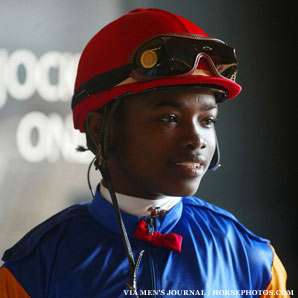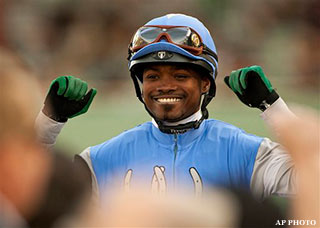Black jockeys once dominated the Kentucky Derby, winning 15 of the first 28 titles between 1875 and 1902. They were former slaves and their sons – a vestige of colonial times, when planters owned both horses and riders. Post–Civil War, they were the country's best riders, but the narrow window opened by Reconstruction was slammed shut by Jim Crow. Even in Northern cities, white jockeys and officials ran black riders off the track, whitewashing their legacy. Churchill Downs was completely segregated throughout the 1950s.
riders. Post–Civil War, they were the country's best riders, but the narrow window opened by Reconstruction was slammed shut by Jim Crow. Even in Northern cities, white jockeys and officials ran black riders off the track, whitewashing their legacy. Churchill Downs was completely segregated throughout the 1950s.
On May 4, 29-year-old jockey Kevin Krigger looks to reverse that history at Churchill Downs, riding Goldencents, an early top-10 favorite trained by Doug O'Neill (who trained last year's winner). Krigger is just the second black jockey to compete in the Derby since 1921, and the first from the U.S. Virgin Islands.
"Years ago, this business was all black riders," says Tom Knust, Krigger's agent. "Now, it's a rarity. He's overcome a lot of obstacles to get where he is."
Indeed, Krigger has chased one of the unlikeliest dreams from the tiny island of St. Croix to horse racing's biggest stage. His passion developed early – he took his first ride at age five, when he snuck out the back door, jumped on a neighbor's horse, and took off at full speed.

"In the Virgin Islands, horses are pets, like dogs or cats in the U.S.," Krigger says. "Our neighbors didn't know I'd be taking theirs for a ride. My great-grandfather saw me fly past him and couldn't believe it."
When he was 10, Krigger's parents gave him a mare of his own. He challenged other kids to races on the beach and down dirt roads. At home, he'd balance his saddle on an arm of the sofa and pretend to ride. And each year, he'd watch the Kentucky Derby on TV and imagine winning. Though Krigger is aware of the ugly side of horse racing's history and the role he could play in returning black jockeys to prominence, he doesn't want it to distract from his performance. "I'm glad as an African-American jockey to be in this position after so long," Krigger says. "But that's not what's going to decide the race."
What might is Krigger's commitment. He gets to the barn at six each morning to exercise horses; when he isn't racing, he trains on a mechanical horse called an Equicizer.
"This young man works his butt off," says Dave Kenney, who co-owns Goldencents with a group that includes Louisville basketball coach Rick Pitino.
He also shows flashes of swagger. The first time he rode Goldencents, Krigger won by seven lengths, almost setting a track record – but he stood up in the saddle and pointed to the crowd at the wire. "We missed the record by a hundredth of a second," Kenney says, laughing. "After that race, I thought, 'What do we have here?'"
Krigger can be forgiven for a little unbridled exuberance. His road to the Derby has been long, from his days as a teenager on St. Croix, walking two hours each way to the island's only racetrack, to his early years in the U.S., where he arrived at 17, traveling to bottom-barrel tracks all over the country trying to attract a trainer or agent. He has worked to keep his weight down (at 5-foot-6, his ideal racing weight is 112 pounds) and fractured his spine in a nasty spill in December 2007. Yet he believed his time would come. "I always felt like a big-circuit rider," he says. "Goldencents is the proof in the pudding."
Knust agrees: "This is his biggest horse to date, and he rides with confidence.
"Kevin's wanted to be on a horse all his life," he continues. "He's just had a love for it. Black, brown, or white, I don't think it matters."
More from Men's Journal:
-- The World’s Most Deadly Race
-- Eight Rules For The Perfect Road Trip





